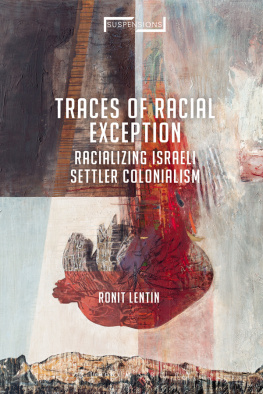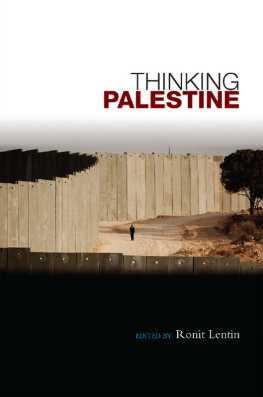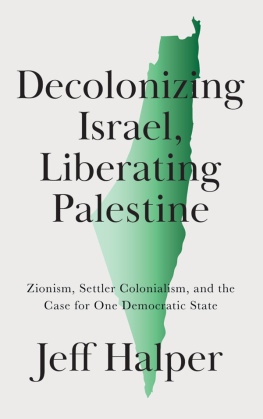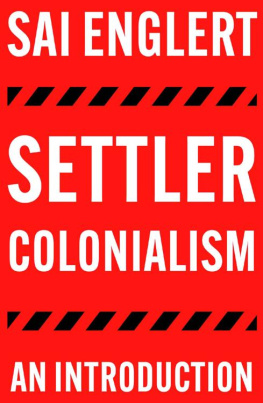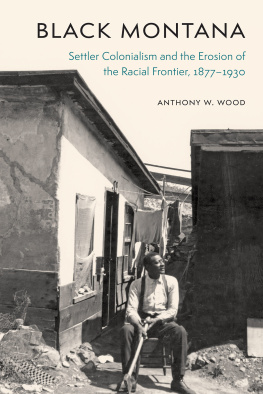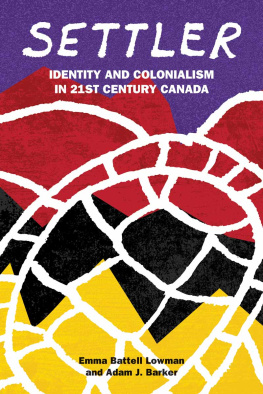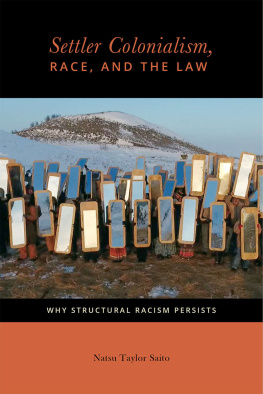Ronit Lentin - Traces of Racial Exception: Racializing Israeli Settler Colonialism
Here you can read online Ronit Lentin - Traces of Racial Exception: Racializing Israeli Settler Colonialism full text of the book (entire story) in english for free. Download pdf and epub, get meaning, cover and reviews about this ebook. year: 2019, publisher: Bloomsbury Academic, genre: History. Description of the work, (preface) as well as reviews are available. Best literature library LitArk.com created for fans of good reading and offers a wide selection of genres:
Romance novel
Science fiction
Adventure
Detective
Science
History
Home and family
Prose
Art
Politics
Computer
Non-fiction
Religion
Business
Children
Humor
Choose a favorite category and find really read worthwhile books. Enjoy immersion in the world of imagination, feel the emotions of the characters or learn something new for yourself, make an fascinating discovery.
- Book:Traces of Racial Exception: Racializing Israeli Settler Colonialism
- Author:
- Publisher:Bloomsbury Academic
- Genre:
- Year:2019
- Rating:4 / 5
- Favourites:Add to favourites
- Your mark:
- 80
- 1
- 2
- 3
- 4
- 5
Traces of Racial Exception: Racializing Israeli Settler Colonialism: summary, description and annotation
We offer to read an annotation, description, summary or preface (depends on what the author of the book "Traces of Racial Exception: Racializing Israeli Settler Colonialism" wrote himself). If you haven't found the necessary information about the book — write in the comments, we will try to find it.
Traces of Racial Exception: Racializing Israeli Settler Colonialism — read online for free the complete book (whole text) full work
Below is the text of the book, divided by pages. System saving the place of the last page read, allows you to conveniently read the book "Traces of Racial Exception: Racializing Israeli Settler Colonialism" online for free, without having to search again every time where you left off. Put a bookmark, and you can go to the page where you finished reading at any time.
Font size:
Interval:
Bookmark:

Traces of Racial Exception
Suspensions: Contemporary Middle Eastern and Islamicate Thought
Series editors: Jason Bahbak Mohaghegh and Lucian Stone
This series interrupts standardized discourses involving the Middle East and the Islamicate world by introducing creative and emerging ideas. The incisive works included in this series provide a counterpoint to the reigning canons of theory, theology, philosophy, literature, and criticism through investigations of vast experiential typologiessuch as violence, mourning, vulnerability, tension, and humorin light of contemporary Middle Eastern and Islamicate thought.
Other titles in this series include:
Gilles Deleuze, Postcolonian Theory, and the Philosophy of Limit, Rda Bensmaa
Against Moderate Islam, Farhang Erfani
The Quran and Modern Arabic Literary Criticism: From Taha to Nasr, Mohammad Salama
Hostage Space of the Contemporary Islamicate World, Dejan Lukic
On the Arab Revolts and the Iranian Revolution, Arshin Adib-Moghaddam
The Politics of Writing Islam, Mahmut Mutman
The Writing of Violence in the Middle East, Jason Bahbak Mohaghegh
Iranian Identity and Cosmopolitanism, edited by Lucian Stone
Continental Philosophy and the Palestinian Question, by Zahi Zalloua
Sorcery, Totem and Jihad, Christopher Wise
Orientalism and Imperialism, Andrew Wilcox
Revolutionary Bodies, Kristin Soraya Batmanghelichi
Plural Maghreb, Abdelkebir Khatibi
Traces of Racial Exception
Racializing Israeli Settler Colonialism
Ronit Lentin

Contents
Poets, artists, theologians, philosophers, and mystics in the Middle East and Islamicate world have been interrogating notions of desire, madness, sensuality, solitude, death, time, space, and so on for centuries, thus constituting an expansive and ever-mutating intellectual landscape. Like all theory and creative outpouring, then, theirs is its own vital constellationa construction cobbled together from singular visceral experiences, intellectual ruins, novel aesthetic techniques, social-political-ideological detours, and premonitions of a futurebuilt and torn down (partially or in toto), and rebuilt again with slight and severe variations. The horizons shift, and frequently leave those who dare traverse these lands bewildered and vulnerable.
Consequently, these thinkers and their visionary ideas largely remain unknown, or worse, mispronounced and misrepresented in the so-called Western world. In the hands of imperialistic frameworks, a select few are deemed worthy of notice and are spoken on behalf of, or rather about. Their ideas are simplified into mere social formulae and empirical scholarly categories. Whereas so-called Western philosophers and writers are given full leniency to contemplate the most incisive or abstract ideas, non-Western thinkers, especially those located in the imagined realms of the Middle East and Islamicate world, are reduced to speaking of purely political histories or monolithic cultural narratives. In other words, they are distorted and contorted to fit within hegemonic paradigms that steal away their more captivating potentials.
Contributors to this series provide a counterpoint to the reigning canons of theory, theology, philosophy, literature, and criticism through investigations of the vast experiential typologies of such regions. Each volume in the series acts as a suspension in the sense that the authors will position contemporary thought in an enigmatic new terrain of inquiry, where it will be compelled to confront unforeseen works of critical and creative imagination. These analyses will not only highlight the full range of current intellectual and artistic trends and their benefits for the citizens of these phantom spheres, but also argue that the ideas themselves are borderless, and thus of great relevance to all citizens of the world.
Jason Bahbak Mohaghegh and Lucian Stone
We stole the lands of another people, but thats not who we are, we are better than this.
We expelled 800,000 of the owners of the land, or made them flee; we renamed their villages and urban neighborhoods and settled our own people in them, but thats not who we are, we are better than this.
We uprooted the trees planted by the owners of the land and planted European conifers to cover the ruins of their depopulated villages, which they are not allowed to settle in and many of which we have made our own, but thats not who we are, we are better than this.
We massacred the populations of whole villages, tortured their men, raped their women and beat and tortured their children, but thats not who we are, we are better than this.
We occupied and annexed those parts of the land we had conquered in our war of independence that the owners of the land call their Nakba, or catastrophe, but thats not who we are, we are better than this.
We bombed their cities, demolished their homes, flattened their refugee camps and since 2002, built a 700-kilometers long concrete wall, which we call the separation barrier and the owners of the land call the apartheid wall, to cut off the owners of the land from each other, but thats not who we are, we are better than this.
We installed hundreds of checkpoints preventing the owners of the land from getting to work, visiting their families, or reaching the hospital to receive medical treatment or to give birth, but thats not who we are, we are better than this.
We started war after war outside the 1949 armistice borders of our state, making hundreds of thousands homeless, claiming self-defense, but thats not who we are, we are better than this.
We put the owners of the land under a military government regime, ruled them with emergency regulations inherited from the British colonizers, enlisted them as collaborators and informers, and controlled their freedom of movement and expression, but thats not who we are, we are better than this.
We operate a separate military court system to try the owners of the land, imprison thousands of them including women and children, and put hundreds in administrative detention without trial, but thats not who we are, we are better than this.
We build our settlements on their lands and allow our illegal settlers to prevent the owners of the land from herding their flocks, tilling their fields and picking their olives, but thats not who we are, we are better than this.
We allow Jewish settlers to take over the homes of the owners of the land and to beat their children while on their way to school, but thats not who we are, we are better than this.
We transferred thousands of Bedouin citizens off their lands and left them in unrecognized villages without electricity, water, roads and schools, and demolish these unrecognized villages again and again, but thats not who we are, we are better than this.
We extrajudicially execute the owners of the land when we suspect that their resistance amounts to terrorist acts, even after they are neutralized and lying defenseless on the ground; we arrest their children in dawn raids, interrogate them without any adults present, and try them in military courts, but thats not who we are, we are better than this.
We lock up asylum seekers, who we call infiltrators, and most of whose cases we never process, in concentration camps away from our towns that they are not permitted to enter, but thats not who we are, we are better than this.
Font size:
Interval:
Bookmark:
Similar books «Traces of Racial Exception: Racializing Israeli Settler Colonialism»
Look at similar books to Traces of Racial Exception: Racializing Israeli Settler Colonialism. We have selected literature similar in name and meaning in the hope of providing readers with more options to find new, interesting, not yet read works.
Discussion, reviews of the book Traces of Racial Exception: Racializing Israeli Settler Colonialism and just readers' own opinions. Leave your comments, write what you think about the work, its meaning or the main characters. Specify what exactly you liked and what you didn't like, and why you think so.

